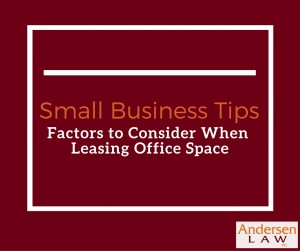 Deciding the location and operating conditions of a small business is an
Deciding the location and operating conditions of a small business is an
important decision to make. Certain types of small businesses may be operated from home, including those who do work such as graphic designers and consultants, off-site services such as electrical and plumbing, and arts and crafts businesses. Running a business out of the home is cheaper than leasing office space, and home business tax deductions that cover home expenses such as rent, property taxes, utilities, and insurance are generally available. However, small business owners must ensure that they are not violating any local zoning laws by operating a business out of their home.
When operating a business from home is not an option, small business owners typically consider leasing office space. Although the commercial real estate market in most of the country remains a tenant’s market in the wake of the recession, the Denver metropolitan region is a different story, as office space vacancy has decreased for six consecutive years and leasing rates continue to increase (averaging $23.81 per square foot for full-service office leases in Denver mid-2015).
Small business owners should consider hiring a real estate broker to help them navigate today’s tough commercial real estate market, as brokers can better evaluate options and help negotiate favorable leasing terms. However, small business owners should also be aware that brokers may not always have their best interests in mind, as brokers work for landlords and receive a commission based on the total leasing price they help secure.
When negotiating the lease (with or without a broker), you should be diligent in ensuring that the lease’s terms and conditions are specified, understood, and agreeable. First, negotiate a term that is acceptable for their current needs yet offers the flexibility for future growth or downsizing. To this end, it’s recommended that small business owners seek a one or two year lease with the possibility for renewal at the end of the lease term. 
Next, small business owners should be aware of what expenses are included in the lease price, what expenses are additional, and how such expenses are apportioned. Additional expenses that may not be incorporated in the lease price include maintenance fees, utilities, and the upkeep of common areas, which may be apportioned on a meteed or square footage basis. Knowing what expenses are included in a lease and how they are apportioned will prevent small business owners from being surprised by hidden fees and help them accurately budget for office space.
Small business owners must also be cognizant of their rights to either assign their lease or sublease to another tenant. If permitted, small business owners can transfer their whole interest in the lease under an assigned lease, but will remain secondarily liable for the assigned tenant’s obligations (unless the assigned tenant assumed all promises of the original lease). Alternatively, small business owners can transfer a portion of their lease interest under a sublease, which is more likely to be permitted than an assigned lease. If you choose to sublease, you and the subleasing tenant are liable to each other, and are both responsible for the lease obligations to the landlord.
Further, small business owners should note that it is not the landlord’s duty to ensure that the premises is safe under common tort law. While landlords have the obligation to maintain common areas (such as hallways and stairwells), warn the tenant of any latent defects the landlord knows or should know about, and complete any repairs they voluntarily assume within a reasonable time, it is the tenant’s responsibility to ensure the leased premises is in a safe condition. This means that tenants are responsible for making routine repairs (other than normal wear and tear) and are liable for injuries sustained by third parties (even if the landlord promised to make all repairs but failed to do so).
Lastly, small business owners must think twice about installing any fixtures on the leased premises because they cannot be removed and will pass with ownership of the land. Under the law of fixtures, anything once moveable that has been annexed to property objectively shows the intent to permanently improve the realty, and removing such an object constitutes voluntary waste. Common fixtures include lighting installations, storm windows, and heating systems.
Whether operating a small business out of the home or finding office space to lease, small business owners should consider multiple factors that may affect their operating space, such as local zoning laws, the current leasing market, real estate brokerage services, potential leasing options, the terms of the lease, and tort liability. By becoming familiar with these factors, you can make decisions about your operating space that will help maximize the success and growth of your businesses.
If you’d like more insight on office space rental, I’d love to help. Contact Andersen Law PC at beth@andersenlawpc.com or 720-922-3880.
